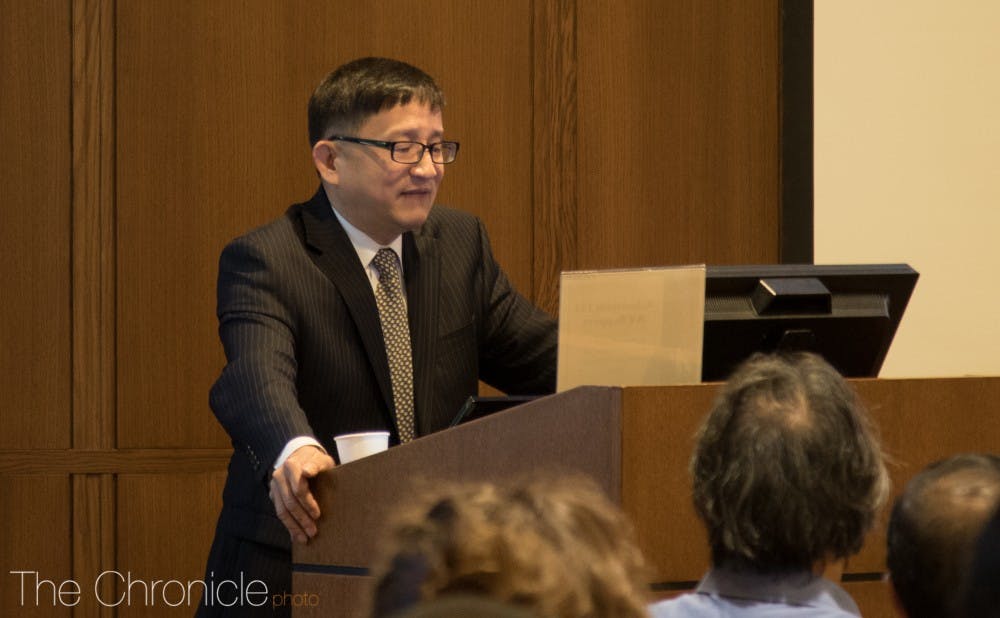China’s domestic politics in the era of Xi Jinping, general secretary of the Communist Party of China (CCP), may be full of uncertainties and dynamism, contrary to popular belief.
In a talk Tuesday hosted by the Asian/Pacific Studies Institute, Cheng Li, director at the Brookings Institution's John L. Thornton China Center elaborated on common stereotypes of Chinese politics.
“In the United States, we lack knowledge of what is going on on the other side of the Pacific,” Li said. “Our biases against China will undermine a balanced understanding of it.”
Many U.S. media outlets portray Xi as an emperor or compare him to Mao Zedong, Li said, but he explained that Xi’s power is nothing compared to that of an emperor, as it faces various constraints. These constraints include an institutional system of checks and balances, an increasingly dynamic society and rapidly changing international environment.
Li added that there is concern surrounding Xi's ambition to challenge the United States, but that Xi is actually seeking more cooperation than competition.
“Xi hopes to maintain a good relationship with the United States.” Li said. “Stability is important for him to [tackle both domestic and international obstacles].”
Because he aims to maintain stability, Xi often comes off as a "man full of contradictions," with conflicting ambitions regarding economic reforms, engaging with foreign NGOs and dealing with major power relations, Li noted. For instance, Xi has presented himself as market-friendly, laying out market reform shortly after taking office but also insisted that China should strengthen its state enterprises. Similarly, Xi promised to include more intellectuals into domestic politics by developing think tanks in China, despite the ongoing heavy-handed restriction of freedom of speech.
China shares common interests regarding reform with the United States in many of these areas, Li said, explaining that the United States should take advantage of them.
“Any predetermined impression of China will only reduce the policy options of the United States,” Li said.
Li added that people tend to misunderstand China’s politics because they do not know how the CCP operates, a focus of his latest book.
“China is a one-party state but that is not to say it does not have checks and balances,” Li said. “[CCP] is divided from within.”
There are two major coalitions within the CCP, including a group of princelings who focus on the coastal region and urban areas and a group of Tuanpai officials who focus on the inland region and rural areas, Li noted. The two coalitions sometimes compete with each other because they have conflicting socio-political interests and geographic constituencies. But they also cooperate and complement each other with their respective skills and expertise because the survival of the party is their common interest.
Li added the CCP is also dynamic in its composition. For instance, the CCP Central Committee has an annual turnover rate of on average 62 percent for the last 30 years.
“China is no democracy but its leadership changes at a much faster rate than most of the democratic countries,” Li said. “The key to the longevity of the Communist Party [of China] is probably that itself is constantly changing.”
Following Li's talk, attendees shared thoughts on its relevance and insight.
Junior Patricia Torvalds said she came to the talk because she was interested in Chinese politics and has taken relevant classes. She noted that the talk expanded her knowledge in this area.
“The Chinese politics classes Duke offers will teach you the basics [of the political system in China],” Torvalds said. “But I never knew there is an internal division of the CCP, for instance.”
Sophomore Cecilia Wu said Li’s research is rather valuable and inspiring partly because of his exclusive access to and insightful interpretation of his personal database of information on Chinese leaders in the past 30 years.
“Dr. Li gives a deep and comprehensive analysis of the elite politics in China,” Wu said. “It is really unique among all the other talks on China’s politics I have been to.”
At the end of his talk, Li quoted one of Xi's favorite ancient Chinese adage, that he often cites. The adage states, "Limited wisdom makes doers; moderate wisdom makes managers; supreme wisdom makes law-builders."
“Will Xi prove he is a leader with supreme wisdom?” Li asked. “We will wait and see.”
Get The Chronicle straight to your inbox
Signup for our weekly newsletter. Cancel at any time.

